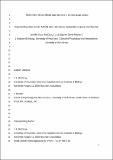Files in this item
Representing other minds : mental state reference is moderated by group membership
Item metadata
| dc.contributor.author | McClung, Jennifer Susan | |
| dc.contributor.author | Reicher, Stephen David | |
| dc.date.accessioned | 2019-05-27T23:37:57Z | |
| dc.date.available | 2019-05-27T23:37:57Z | |
| dc.date.issued | 2018-05 | |
| dc.identifier | 251665819 | |
| dc.identifier | 0f4b6be0-30f6-490e-9106-a3aaa11818b3 | |
| dc.identifier | 85035217499 | |
| dc.identifier | 000432508900037 | |
| dc.identifier.citation | McClung , J S & Reicher , S D 2018 , ' Representing other minds : mental state reference is moderated by group membership ' , Journal of Experimental Social Psychology , vol. 76 , pp. 385-392 . https://doi.org/10.1016/j.jesp.2017.11.013 | en |
| dc.identifier.issn | 0022-1031 | |
| dc.identifier.other | RIS: urn:D61607B6BB6E8DD0423CC9C4A1E7923D | |
| dc.identifier.uri | https://hdl.handle.net/10023/17767 | |
| dc.description | This work was supported by a departmental stipend to the first author from the University of St Andrews, St Andrews, UK. | en |
| dc.description.abstract | The ability to infer the psychological forces that drive others' behaviour is a cornerstone of human cognition. This ‘theory of mind’ (ToM) we have has been extensively studied in its developmental stages and non-human forms. However, how the fully developed theory of mind functions on a daily basis is still the focus of ongoing research. One capacity stemming from theory of mind involves overt linguistic mental state reference. We propose that, rather than being a capacity that those with a fully developed ToM use consistently, mental state reference is a function of our social relationship to others: specifically, whether the other is perceived as an in-group or out-group member. We therefore examined spontaneous mental state reference during casual conversation as a function of group membership. Participants were divided into ‘in-group’ or ‘out-group’ pairs using a classic minimal group paradigm. Next, they were allowed to converse casually with their partner without the experimenter present and then subsequently asked to describe their partner in a written format after interactions. We scored participants' conversations and their written descriptions of each other for frequency and complexity of mental state reference. Results showed that, when interacting with presumed out-group members, participants referenced their partners' mental states significantly less often than when interacting with presumed in-group members. This effect was found both during conversations and in subsequent descriptions of the partner. Spontaneous mental state reference is apparently not a consistent psychological process but instead subject to social constructs, specifically group membership. | |
| dc.format.extent | 271720 | |
| dc.language.iso | eng | |
| dc.relation.ispartof | Journal of Experimental Social Psychology | en |
| dc.subject | Theory of mind | en |
| dc.subject | Inter-group | en |
| dc.subject | Mental state attribution | en |
| dc.subject | Mental state reference | en |
| dc.subject | BF Psychology | en |
| dc.subject | DAS | en |
| dc.subject.lcc | BF | en |
| dc.title | Representing other minds : mental state reference is moderated by group membership | en |
| dc.type | Journal article | en |
| dc.contributor.institution | University of St Andrews. School of Psychology and Neuroscience | en |
| dc.contributor.institution | University of St Andrews. St Andrews Sustainability Institute | en |
| dc.identifier.doi | https://doi.org/10.1016/j.jesp.2017.11.013 | |
| dc.description.status | Peer reviewed | en |
| dc.date.embargoedUntil | 2019-05-28 |
This item appears in the following Collection(s)
Items in the St Andrews Research Repository are protected by copyright, with all rights reserved, unless otherwise indicated.

